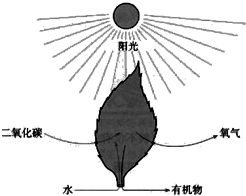图是光合作用示意图.请分析作答:
(1)写出光合作用的反应式.
(2)简述绿色植物在维持碳-氧平衡方面的作用.
(3)人类过度开采、使用煤炭和石油,导致排入大气中的二氧化碳大量增加,可能会引起什么全球性问题?
(4)为了保持环境的空气清新,我们应该做些什么?

(1)、绿色植物的光合作用是指绿色植物利用光能在叶绿体里把二氧化碳和水等无机物合成有机物,释放氧气,同时把光能转变成化学能储存在合成的有机物中的过程.其公式可表示为:
二氧化碳+水

有机物(储存能量)+氧气
(2)、绿色植物的光合作用有其重要的意义.一是完成了物质转化:把无机物转化成有机物,一部分用来构建植物体自身,一部分为其它生物提供食物来源,同时放出氧气供生物呼吸利用; 二是完成了能量转化:把光能转变成化学能储存在有机物中,是自然界中的能量源泉;三是绿色植物进行光合作用吸收二氧化碳,释放氧气,促进了生物圈的碳氧平衡.
(3)、人类过度开采、使用煤炭和石油,导致排入大气中的二氧化碳大量增加,二氧化碳气体具有吸热和隔热的功能,二氧化碳在大气中增多的结果是形成一种无形的玻璃罩,使太阳辐射到地球上的热量无法向外层空间发散,其结果是地球表面变热起来,即引起温室效应.
(4)、由绿色植物的光合作用的公式可知,光合作用能消耗二氧化碳,放出氧气,使环境的空气清新.因此,我们为了保持环境的空气清新,要多爱护植被、植树造林等.
故答案为:(1)二氧化碳+水

有机物(储存能量)+氧气
(2)绿色植物能吸收二氧化碳,释放氧气,这有助于维持生物圈中的碳-氧平衡.
(3)温室效应.
(4)爱护植被、植树造林.
